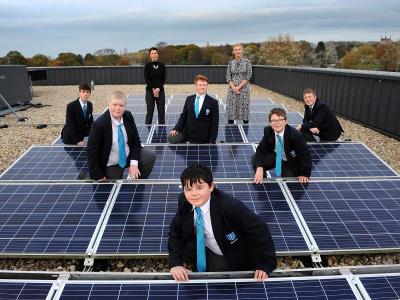City schools turn climate activists for COP26

As world leaders descended upon COP26 to discuss how to save the planet, scores of Sunderland school children have been taking matters into their own hands and are doing their bit to tackle global climate change.
Hundreds of pupils from six secondary schools and two primary schools began a series of projects during the course of COP26 to do their bit to save the planet.
The projects, supported by Sunderland City Council as part of a programme to celebrate the UK hosting COP26 , saw students design and deliver a range of carbon-cutting initiatives, from planting trees to creating orchards, reducing single-use plastics and harvesting willow.
Schools across the city were asked to submit applications to drive forward local environmental change, as part of this programme which starts with those most likely to be impacted by climate change, the city's children and young people.
Throughout the 13-day event, hundreds of pupils got involved in the initiative, including young people from Albany Village Primary School, Broadway Junior School, Monkwearmouth Academy, Southmoor Academy, Sandhill View Academy, St. Aidan's Catholic Academy, Kepier Academy and Washington Academy.
Pupils from Kepier Academy are among the most active - establishing a plant exchange to buy wild seeds, plants, clay and compost; constructing a school-run orchard; setting up an Eco Club to lead on future green initiatives and rallying for the use of more renewable energy and electric vehicle charging points.
The school has also recently invested in solar panels and a wind turbine to generate its own renewable energy to support its energy needs and which it can also sell on to the grid.
Mrs Ashton, principal at Kepier Academy, said: "As an 'Eco-Schools Green Flag' School, we are committed to making a difference by educating learners about our environment. Every individual can make a difference to preserving our planet. It's about connecting what an individual can do that will have an impact on a global scale.
"For instance, putting rubbish in the bin; switching off lights when leaving a room, turning off the water when brushing teeth or recycling their waste plastic may seem small and insignificant actions, but if everyone commits to these actions, the impact would be such a positive one for our beautiful world. We don't have a choice, we must care for and preserve our environment to guarantee a healthy life now, as well as a good life for future generations."
The student eco group at Kepier, added: "We are the Eco Committee and we are the future. We are finding solutions to change the world in a sustainable way and we are starting in Kepier: right here, right now. We were delighted with funding provided around COP26 to buy trees and bushes for our Orchard, which will eventually support the kitchen in fresh fruit. We have also started a Kepier Plant Exchange to encourage the love of plants."
Participating schools had to submit creative project ideas detailing how they would bring their projects to life and what the positive impacts would be. In total, £2,600 was given out to the successful applicants, with scores of projects coming to fruition as a result.
Cllr Graeme Miller, leader of Sunderland City Council, said: "It's been great to hear about each of the low carbon projects developed by the schools. The young people have been so enthused by the initiative and it's fantastic to see how passionate and willing they are to join the fight to save the planet.
"Not only has it given the students support with some of the resources required to develop and roll out their own carbon reducing projects, but it has also encouraged them to think creatively and the innovative solutions they have come up with have blown us away. As we look to the future, it's pivotal that the next generation have the skills required to make the switch to a more sustainable way of living and the ability to support a greener economy, and if the ingenuity of the participants in this project are anything to go by, then the future certainly looks bright."
The launch of the COP26 school engagement programme also coincided with the establishing of the city's first Environment Green Social (ESG) Group, an advisory group brought together of young people across the city, to help city leaders deliver Sunderland's Low Carbon Framework.
Partners across the city signed up to the Low Carbon Framework last December, with the aim of driving down emissions and seeking to make the city carbon neutral by 2040 and the EGS group will play a key role in helping the city achieve its ambitions.
Cllr Miller added: "We know this is an issue of critical importance to Sunderland's young people and we are delighted to have them involved and contributing to all the work that we are taking forward on this agenda.
"There is much to do, but in establishing this group to help drive forward the Low Carbon Framework and by engaging with schools like we have, I am confident we can achieve our ambitious targets. Sunderland people always come together when there is a crisis - and this is a very real crisis. It's one that requires a collective and sustained effort.
"I am confident that - together - we can all make a real difference."
For more information on the Low Carbon Framework, visit: https://www.sunderland.gov.uk/lowcarbon or to keep up to date with the progress of the EGS group, follow #WearSustainable on social media.




